The Impact of Racism on Indigenous Australian Health, Essay
VerifiedAdded on 2022/11/26
|10
|2913
|454
Essay
AI Summary
This essay critically analyzes the profound impact of racism on the health of Indigenous Australians. It explores how historical and contemporary racism, both individual and systemic, contributes to significant health disparities, including poorer mental and physical health outcomes. The essay examines various manifestations of racism, such as interpersonal discrimination, institutional biases in healthcare and education, and the role of social determinants like low income and addiction. It highlights the link between racism and chronic stress, emotional difficulties, and reduced access to essential resources. Furthermore, the essay discusses the concept of denial surrounding racism and its implications, emphasizing the need for culturally competent healthcare and addressing the root causes of inequality to improve Indigenous health outcomes. The assignment also explores the indirect impacts of racism, such as the loss of motivation, emotional distress, and cultural biases in healthcare, ultimately affecting the quality of life for Indigenous Australians.
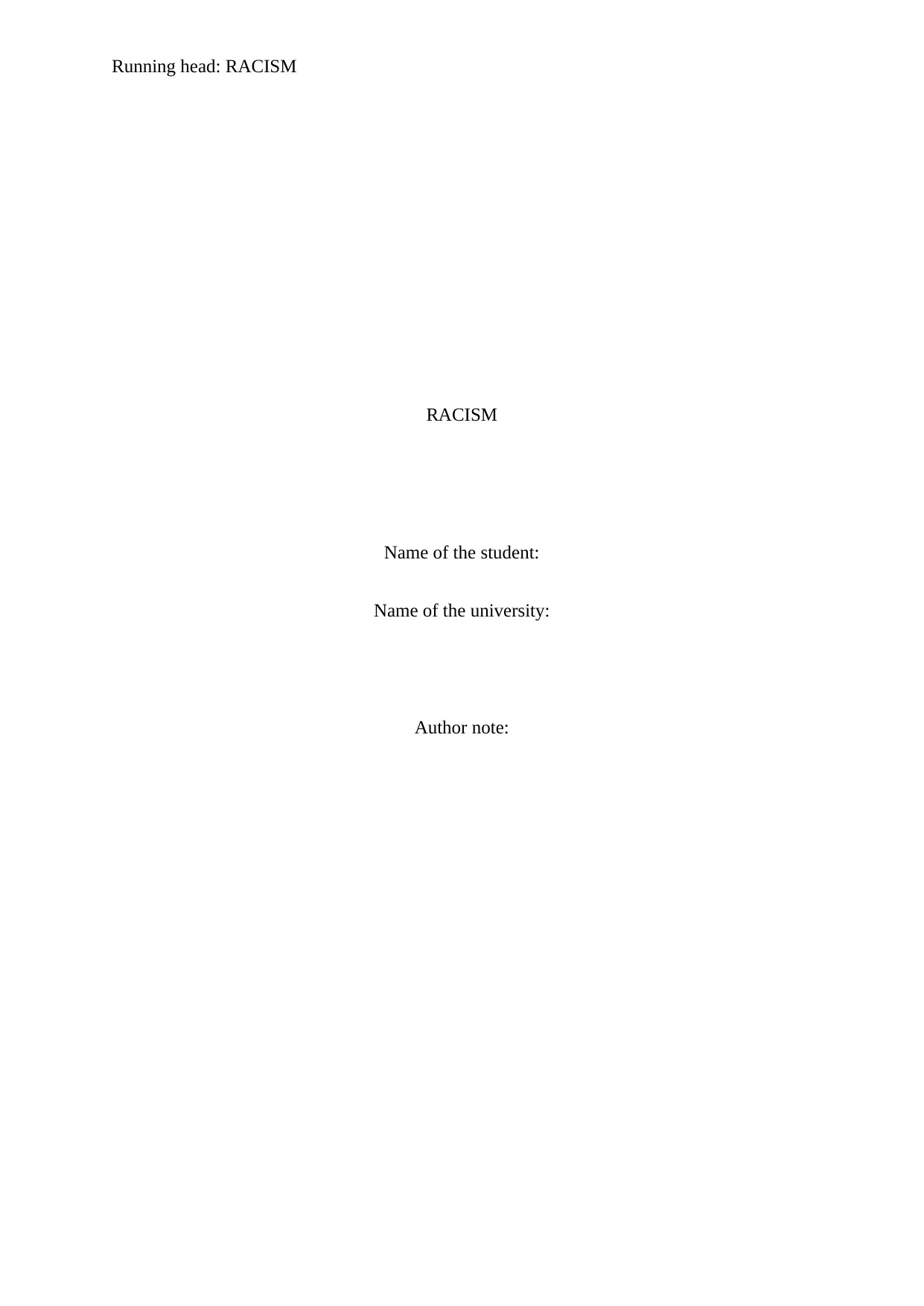
Running head: RACISM
RACISM
Name of the student:
Name of the university:
Author note:
RACISM
Name of the student:
Name of the university:
Author note:
Paraphrase This Document
Need a fresh take? Get an instant paraphrase of this document with our AI Paraphraser
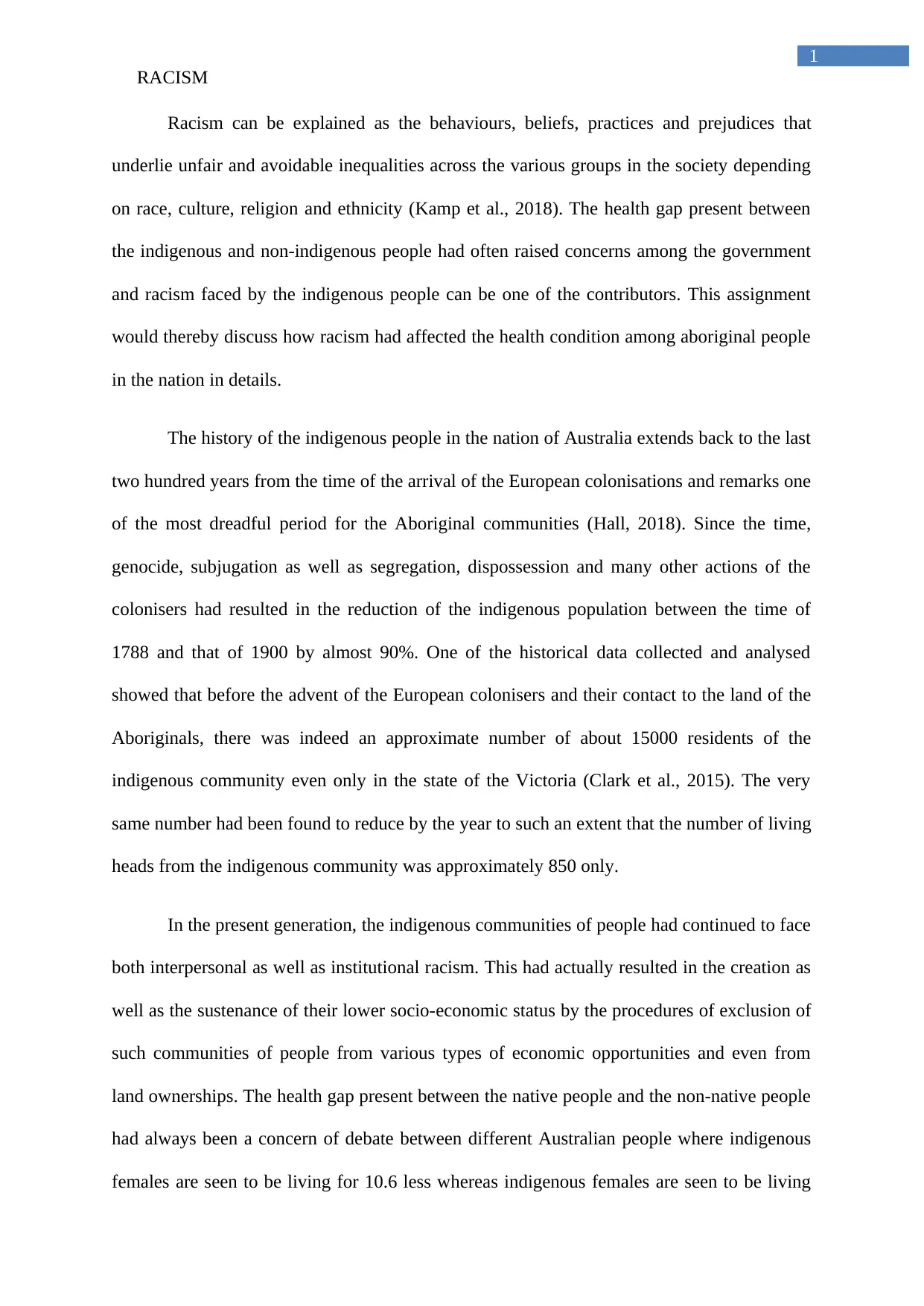
1
RACISM
Racism can be explained as the behaviours, beliefs, practices and prejudices that
underlie unfair and avoidable inequalities across the various groups in the society depending
on race, culture, religion and ethnicity (Kamp et al., 2018). The health gap present between
the indigenous and non-indigenous people had often raised concerns among the government
and racism faced by the indigenous people can be one of the contributors. This assignment
would thereby discuss how racism had affected the health condition among aboriginal people
in the nation in details.
The history of the indigenous people in the nation of Australia extends back to the last
two hundred years from the time of the arrival of the European colonisations and remarks one
of the most dreadful period for the Aboriginal communities (Hall, 2018). Since the time,
genocide, subjugation as well as segregation, dispossession and many other actions of the
colonisers had resulted in the reduction of the indigenous population between the time of
1788 and that of 1900 by almost 90%. One of the historical data collected and analysed
showed that before the advent of the European colonisers and their contact to the land of the
Aboriginals, there was indeed an approximate number of about 15000 residents of the
indigenous community even only in the state of the Victoria (Clark et al., 2015). The very
same number had been found to reduce by the year to such an extent that the number of living
heads from the indigenous community was approximately 850 only.
In the present generation, the indigenous communities of people had continued to face
both interpersonal as well as institutional racism. This had actually resulted in the creation as
well as the sustenance of their lower socio-economic status by the procedures of exclusion of
such communities of people from various types of economic opportunities and even from
land ownerships. The health gap present between the native people and the non-native people
had always been a concern of debate between different Australian people where indigenous
females are seen to be living for 10.6 less whereas indigenous females are seen to be living
RACISM
Racism can be explained as the behaviours, beliefs, practices and prejudices that
underlie unfair and avoidable inequalities across the various groups in the society depending
on race, culture, religion and ethnicity (Kamp et al., 2018). The health gap present between
the indigenous and non-indigenous people had often raised concerns among the government
and racism faced by the indigenous people can be one of the contributors. This assignment
would thereby discuss how racism had affected the health condition among aboriginal people
in the nation in details.
The history of the indigenous people in the nation of Australia extends back to the last
two hundred years from the time of the arrival of the European colonisations and remarks one
of the most dreadful period for the Aboriginal communities (Hall, 2018). Since the time,
genocide, subjugation as well as segregation, dispossession and many other actions of the
colonisers had resulted in the reduction of the indigenous population between the time of
1788 and that of 1900 by almost 90%. One of the historical data collected and analysed
showed that before the advent of the European colonisers and their contact to the land of the
Aboriginals, there was indeed an approximate number of about 15000 residents of the
indigenous community even only in the state of the Victoria (Clark et al., 2015). The very
same number had been found to reduce by the year to such an extent that the number of living
heads from the indigenous community was approximately 850 only.
In the present generation, the indigenous communities of people had continued to face
both interpersonal as well as institutional racism. This had actually resulted in the creation as
well as the sustenance of their lower socio-economic status by the procedures of exclusion of
such communities of people from various types of economic opportunities and even from
land ownerships. The health gap present between the native people and the non-native people
had always been a concern of debate between different Australian people where indigenous
females are seen to be living for 10.6 less whereas indigenous females are seen to be living
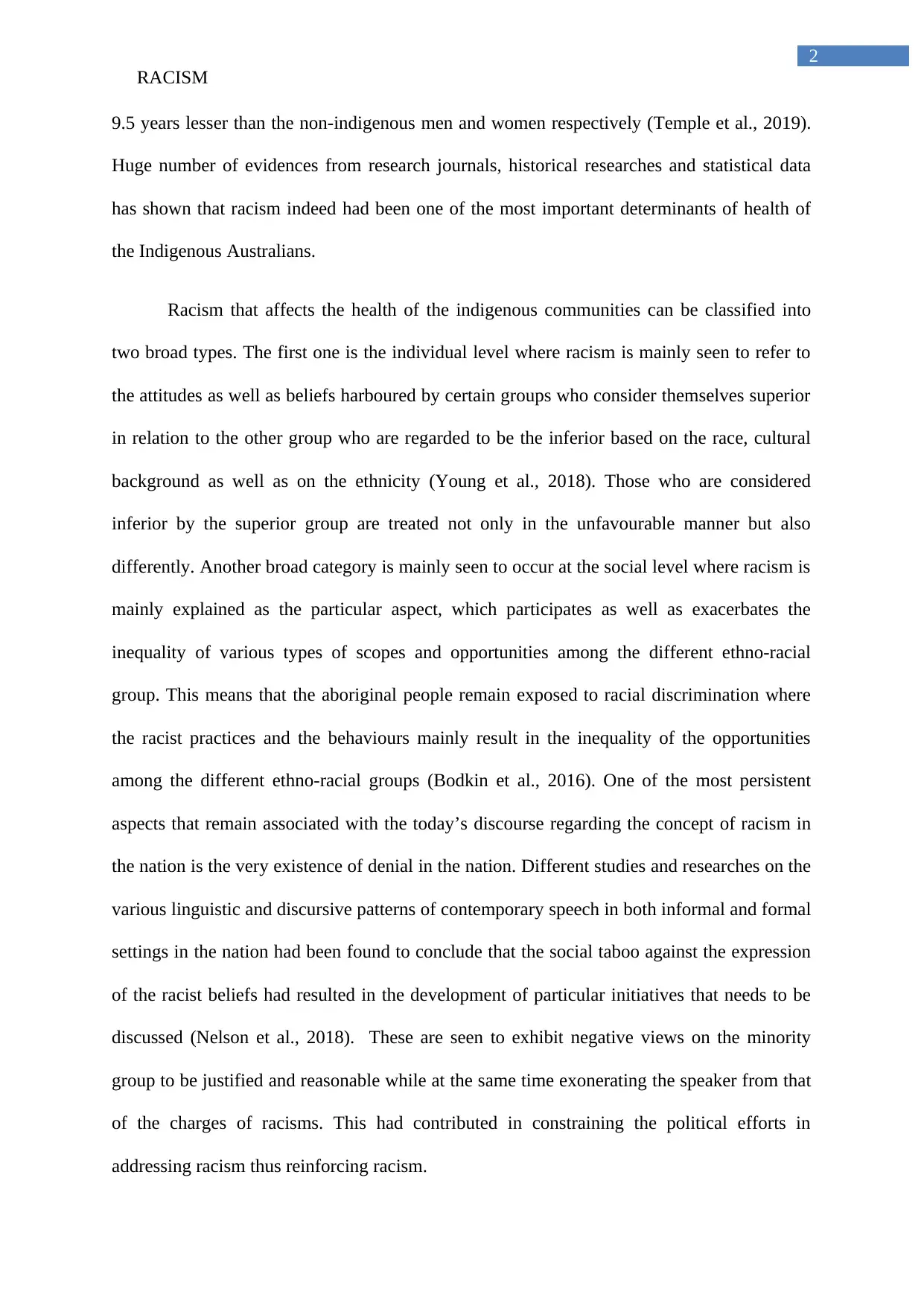
2
RACISM
9.5 years lesser than the non-indigenous men and women respectively (Temple et al., 2019).
Huge number of evidences from research journals, historical researches and statistical data
has shown that racism indeed had been one of the most important determinants of health of
the Indigenous Australians.
Racism that affects the health of the indigenous communities can be classified into
two broad types. The first one is the individual level where racism is mainly seen to refer to
the attitudes as well as beliefs harboured by certain groups who consider themselves superior
in relation to the other group who are regarded to be the inferior based on the race, cultural
background as well as on the ethnicity (Young et al., 2018). Those who are considered
inferior by the superior group are treated not only in the unfavourable manner but also
differently. Another broad category is mainly seen to occur at the social level where racism is
mainly explained as the particular aspect, which participates as well as exacerbates the
inequality of various types of scopes and opportunities among the different ethno-racial
group. This means that the aboriginal people remain exposed to racial discrimination where
the racist practices and the behaviours mainly result in the inequality of the opportunities
among the different ethno-racial groups (Bodkin et al., 2016). One of the most persistent
aspects that remain associated with the today’s discourse regarding the concept of racism in
the nation is the very existence of denial in the nation. Different studies and researches on the
various linguistic and discursive patterns of contemporary speech in both informal and formal
settings in the nation had been found to conclude that the social taboo against the expression
of the racist beliefs had resulted in the development of particular initiatives that needs to be
discussed (Nelson et al., 2018). These are seen to exhibit negative views on the minority
group to be justified and reasonable while at the same time exonerating the speaker from that
of the charges of racisms. This had contributed in constraining the political efforts in
addressing racism thus reinforcing racism.
RACISM
9.5 years lesser than the non-indigenous men and women respectively (Temple et al., 2019).
Huge number of evidences from research journals, historical researches and statistical data
has shown that racism indeed had been one of the most important determinants of health of
the Indigenous Australians.
Racism that affects the health of the indigenous communities can be classified into
two broad types. The first one is the individual level where racism is mainly seen to refer to
the attitudes as well as beliefs harboured by certain groups who consider themselves superior
in relation to the other group who are regarded to be the inferior based on the race, cultural
background as well as on the ethnicity (Young et al., 2018). Those who are considered
inferior by the superior group are treated not only in the unfavourable manner but also
differently. Another broad category is mainly seen to occur at the social level where racism is
mainly explained as the particular aspect, which participates as well as exacerbates the
inequality of various types of scopes and opportunities among the different ethno-racial
group. This means that the aboriginal people remain exposed to racial discrimination where
the racist practices and the behaviours mainly result in the inequality of the opportunities
among the different ethno-racial groups (Bodkin et al., 2016). One of the most persistent
aspects that remain associated with the today’s discourse regarding the concept of racism in
the nation is the very existence of denial in the nation. Different studies and researches on the
various linguistic and discursive patterns of contemporary speech in both informal and formal
settings in the nation had been found to conclude that the social taboo against the expression
of the racist beliefs had resulted in the development of particular initiatives that needs to be
discussed (Nelson et al., 2018). These are seen to exhibit negative views on the minority
group to be justified and reasonable while at the same time exonerating the speaker from that
of the charges of racisms. This had contributed in constraining the political efforts in
addressing racism thus reinforcing racism.
⊘ This is a preview!⊘
Do you want full access?
Subscribe today to unlock all pages.

Trusted by 1+ million students worldwide
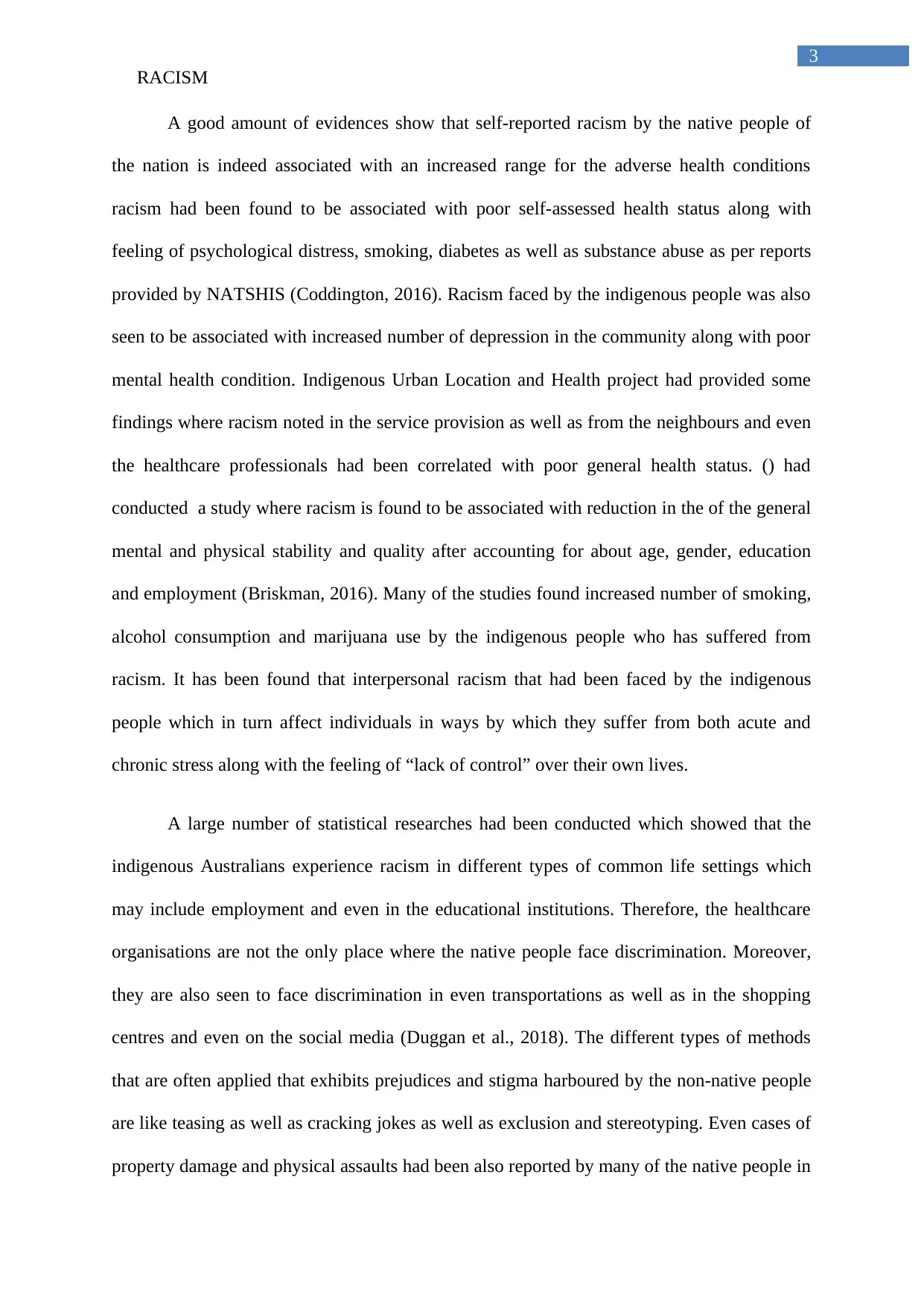
3
RACISM
A good amount of evidences show that self-reported racism by the native people of
the nation is indeed associated with an increased range for the adverse health conditions
racism had been found to be associated with poor self-assessed health status along with
feeling of psychological distress, smoking, diabetes as well as substance abuse as per reports
provided by NATSHIS (Coddington, 2016). Racism faced by the indigenous people was also
seen to be associated with increased number of depression in the community along with poor
mental health condition. Indigenous Urban Location and Health project had provided some
findings where racism noted in the service provision as well as from the neighbours and even
the healthcare professionals had been correlated with poor general health status. () had
conducted a study where racism is found to be associated with reduction in the of the general
mental and physical stability and quality after accounting for about age, gender, education
and employment (Briskman, 2016). Many of the studies found increased number of smoking,
alcohol consumption and marijuana use by the indigenous people who has suffered from
racism. It has been found that interpersonal racism that had been faced by the indigenous
people which in turn affect individuals in ways by which they suffer from both acute and
chronic stress along with the feeling of “lack of control” over their own lives.
A large number of statistical researches had been conducted which showed that the
indigenous Australians experience racism in different types of common life settings which
may include employment and even in the educational institutions. Therefore, the healthcare
organisations are not the only place where the native people face discrimination. Moreover,
they are also seen to face discrimination in even transportations as well as in the shopping
centres and even on the social media (Duggan et al., 2018). The different types of methods
that are often applied that exhibits prejudices and stigma harboured by the non-native people
are like teasing as well as cracking jokes as well as exclusion and stereotyping. Even cases of
property damage and physical assaults had been also reported by many of the native people in
RACISM
A good amount of evidences show that self-reported racism by the native people of
the nation is indeed associated with an increased range for the adverse health conditions
racism had been found to be associated with poor self-assessed health status along with
feeling of psychological distress, smoking, diabetes as well as substance abuse as per reports
provided by NATSHIS (Coddington, 2016). Racism faced by the indigenous people was also
seen to be associated with increased number of depression in the community along with poor
mental health condition. Indigenous Urban Location and Health project had provided some
findings where racism noted in the service provision as well as from the neighbours and even
the healthcare professionals had been correlated with poor general health status. () had
conducted a study where racism is found to be associated with reduction in the of the general
mental and physical stability and quality after accounting for about age, gender, education
and employment (Briskman, 2016). Many of the studies found increased number of smoking,
alcohol consumption and marijuana use by the indigenous people who has suffered from
racism. It has been found that interpersonal racism that had been faced by the indigenous
people which in turn affect individuals in ways by which they suffer from both acute and
chronic stress along with the feeling of “lack of control” over their own lives.
A large number of statistical researches had been conducted which showed that the
indigenous Australians experience racism in different types of common life settings which
may include employment and even in the educational institutions. Therefore, the healthcare
organisations are not the only place where the native people face discrimination. Moreover,
they are also seen to face discrimination in even transportations as well as in the shopping
centres and even on the social media (Duggan et al., 2018). The different types of methods
that are often applied that exhibits prejudices and stigma harboured by the non-native people
are like teasing as well as cracking jokes as well as exclusion and stereotyping. Even cases of
property damage and physical assaults had been also reported by many of the native people in
Paraphrase This Document
Need a fresh take? Get an instant paraphrase of this document with our AI Paraphraser
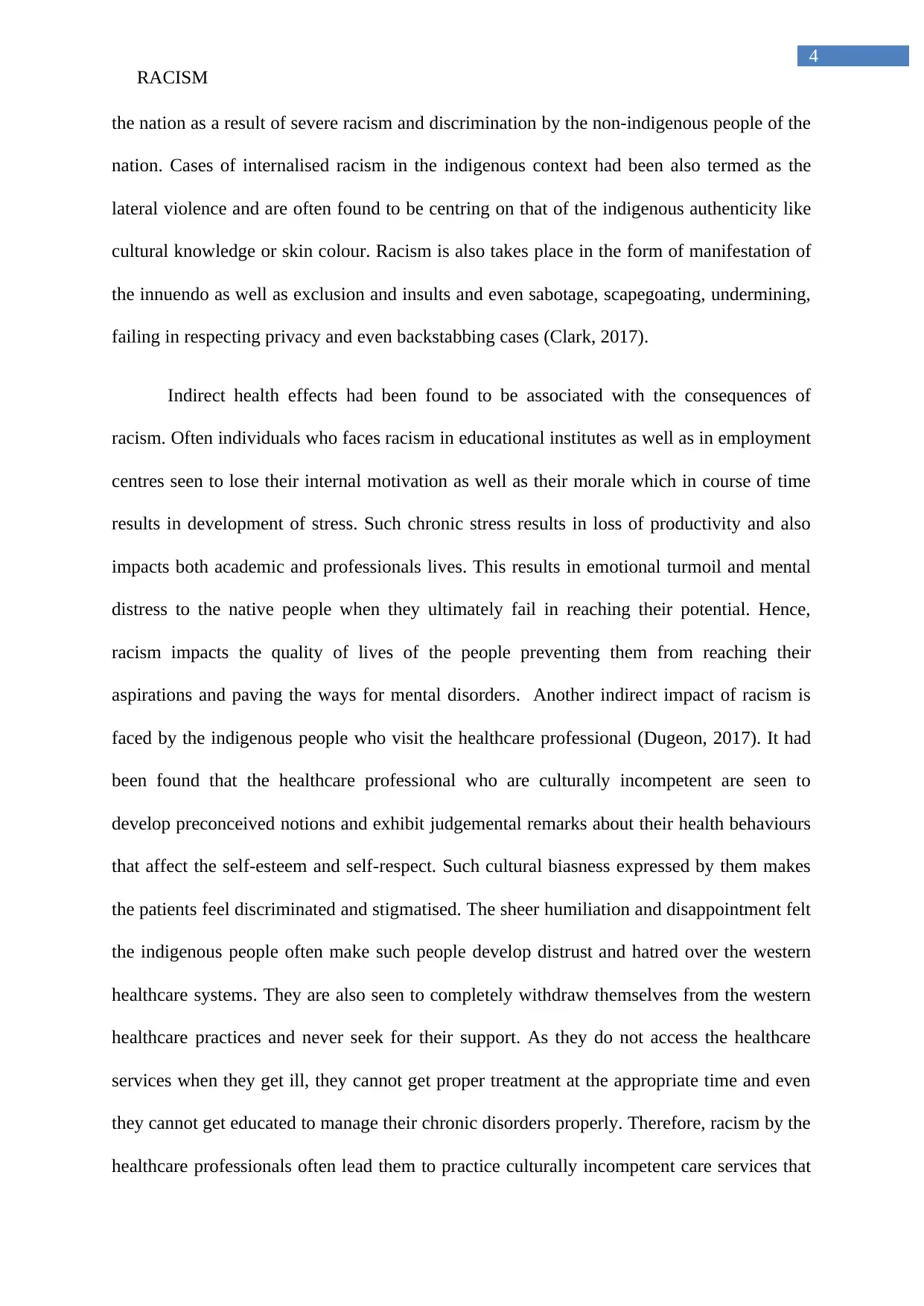
4
RACISM
the nation as a result of severe racism and discrimination by the non-indigenous people of the
nation. Cases of internalised racism in the indigenous context had been also termed as the
lateral violence and are often found to be centring on that of the indigenous authenticity like
cultural knowledge or skin colour. Racism is also takes place in the form of manifestation of
the innuendo as well as exclusion and insults and even sabotage, scapegoating, undermining,
failing in respecting privacy and even backstabbing cases (Clark, 2017).
Indirect health effects had been found to be associated with the consequences of
racism. Often individuals who faces racism in educational institutes as well as in employment
centres seen to lose their internal motivation as well as their morale which in course of time
results in development of stress. Such chronic stress results in loss of productivity and also
impacts both academic and professionals lives. This results in emotional turmoil and mental
distress to the native people when they ultimately fail in reaching their potential. Hence,
racism impacts the quality of lives of the people preventing them from reaching their
aspirations and paving the ways for mental disorders. Another indirect impact of racism is
faced by the indigenous people who visit the healthcare professional (Dugeon, 2017). It had
been found that the healthcare professional who are culturally incompetent are seen to
develop preconceived notions and exhibit judgemental remarks about their health behaviours
that affect the self-esteem and self-respect. Such cultural biasness expressed by them makes
the patients feel discriminated and stigmatised. The sheer humiliation and disappointment felt
the indigenous people often make such people develop distrust and hatred over the western
healthcare systems. They are also seen to completely withdraw themselves from the western
healthcare practices and never seek for their support. As they do not access the healthcare
services when they get ill, they cannot get proper treatment at the appropriate time and even
they cannot get educated to manage their chronic disorders properly. Therefore, racism by the
healthcare professionals often lead them to practice culturally incompetent care services that
RACISM
the nation as a result of severe racism and discrimination by the non-indigenous people of the
nation. Cases of internalised racism in the indigenous context had been also termed as the
lateral violence and are often found to be centring on that of the indigenous authenticity like
cultural knowledge or skin colour. Racism is also takes place in the form of manifestation of
the innuendo as well as exclusion and insults and even sabotage, scapegoating, undermining,
failing in respecting privacy and even backstabbing cases (Clark, 2017).
Indirect health effects had been found to be associated with the consequences of
racism. Often individuals who faces racism in educational institutes as well as in employment
centres seen to lose their internal motivation as well as their morale which in course of time
results in development of stress. Such chronic stress results in loss of productivity and also
impacts both academic and professionals lives. This results in emotional turmoil and mental
distress to the native people when they ultimately fail in reaching their potential. Hence,
racism impacts the quality of lives of the people preventing them from reaching their
aspirations and paving the ways for mental disorders. Another indirect impact of racism is
faced by the indigenous people who visit the healthcare professional (Dugeon, 2017). It had
been found that the healthcare professional who are culturally incompetent are seen to
develop preconceived notions and exhibit judgemental remarks about their health behaviours
that affect the self-esteem and self-respect. Such cultural biasness expressed by them makes
the patients feel discriminated and stigmatised. The sheer humiliation and disappointment felt
the indigenous people often make such people develop distrust and hatred over the western
healthcare systems. They are also seen to completely withdraw themselves from the western
healthcare practices and never seek for their support. As they do not access the healthcare
services when they get ill, they cannot get proper treatment at the appropriate time and even
they cannot get educated to manage their chronic disorders properly. Therefore, racism by the
healthcare professionals often lead them to practice culturally incompetent care services that
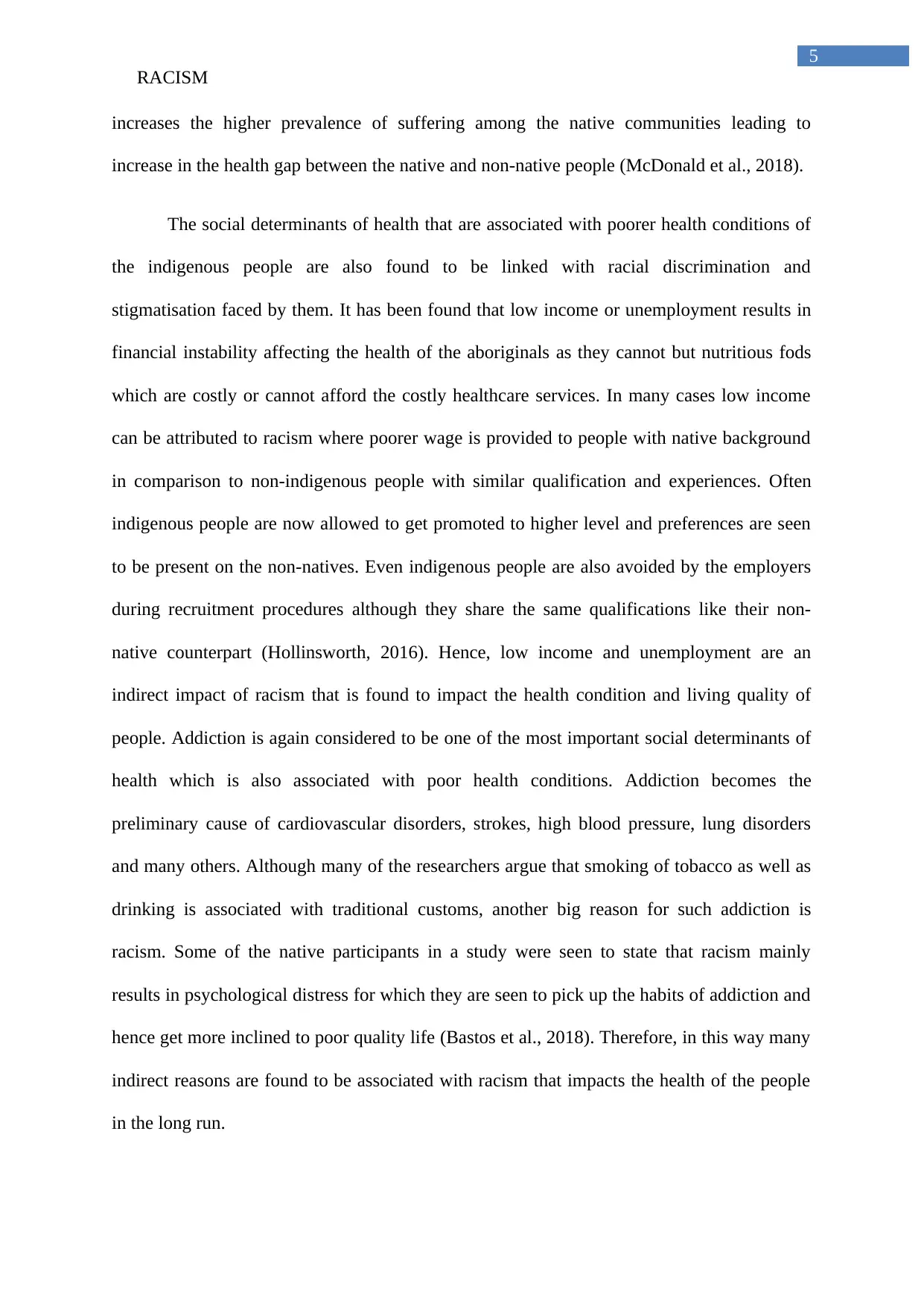
5
RACISM
increases the higher prevalence of suffering among the native communities leading to
increase in the health gap between the native and non-native people (McDonald et al., 2018).
The social determinants of health that are associated with poorer health conditions of
the indigenous people are also found to be linked with racial discrimination and
stigmatisation faced by them. It has been found that low income or unemployment results in
financial instability affecting the health of the aboriginals as they cannot but nutritious fods
which are costly or cannot afford the costly healthcare services. In many cases low income
can be attributed to racism where poorer wage is provided to people with native background
in comparison to non-indigenous people with similar qualification and experiences. Often
indigenous people are now allowed to get promoted to higher level and preferences are seen
to be present on the non-natives. Even indigenous people are also avoided by the employers
during recruitment procedures although they share the same qualifications like their non-
native counterpart (Hollinsworth, 2016). Hence, low income and unemployment are an
indirect impact of racism that is found to impact the health condition and living quality of
people. Addiction is again considered to be one of the most important social determinants of
health which is also associated with poor health conditions. Addiction becomes the
preliminary cause of cardiovascular disorders, strokes, high blood pressure, lung disorders
and many others. Although many of the researchers argue that smoking of tobacco as well as
drinking is associated with traditional customs, another big reason for such addiction is
racism. Some of the native participants in a study were seen to state that racism mainly
results in psychological distress for which they are seen to pick up the habits of addiction and
hence get more inclined to poor quality life (Bastos et al., 2018). Therefore, in this way many
indirect reasons are found to be associated with racism that impacts the health of the people
in the long run.
RACISM
increases the higher prevalence of suffering among the native communities leading to
increase in the health gap between the native and non-native people (McDonald et al., 2018).
The social determinants of health that are associated with poorer health conditions of
the indigenous people are also found to be linked with racial discrimination and
stigmatisation faced by them. It has been found that low income or unemployment results in
financial instability affecting the health of the aboriginals as they cannot but nutritious fods
which are costly or cannot afford the costly healthcare services. In many cases low income
can be attributed to racism where poorer wage is provided to people with native background
in comparison to non-indigenous people with similar qualification and experiences. Often
indigenous people are now allowed to get promoted to higher level and preferences are seen
to be present on the non-natives. Even indigenous people are also avoided by the employers
during recruitment procedures although they share the same qualifications like their non-
native counterpart (Hollinsworth, 2016). Hence, low income and unemployment are an
indirect impact of racism that is found to impact the health condition and living quality of
people. Addiction is again considered to be one of the most important social determinants of
health which is also associated with poor health conditions. Addiction becomes the
preliminary cause of cardiovascular disorders, strokes, high blood pressure, lung disorders
and many others. Although many of the researchers argue that smoking of tobacco as well as
drinking is associated with traditional customs, another big reason for such addiction is
racism. Some of the native participants in a study were seen to state that racism mainly
results in psychological distress for which they are seen to pick up the habits of addiction and
hence get more inclined to poor quality life (Bastos et al., 2018). Therefore, in this way many
indirect reasons are found to be associated with racism that impacts the health of the people
in the long run.
⊘ This is a preview!⊘
Do you want full access?
Subscribe today to unlock all pages.

Trusted by 1+ million students worldwide
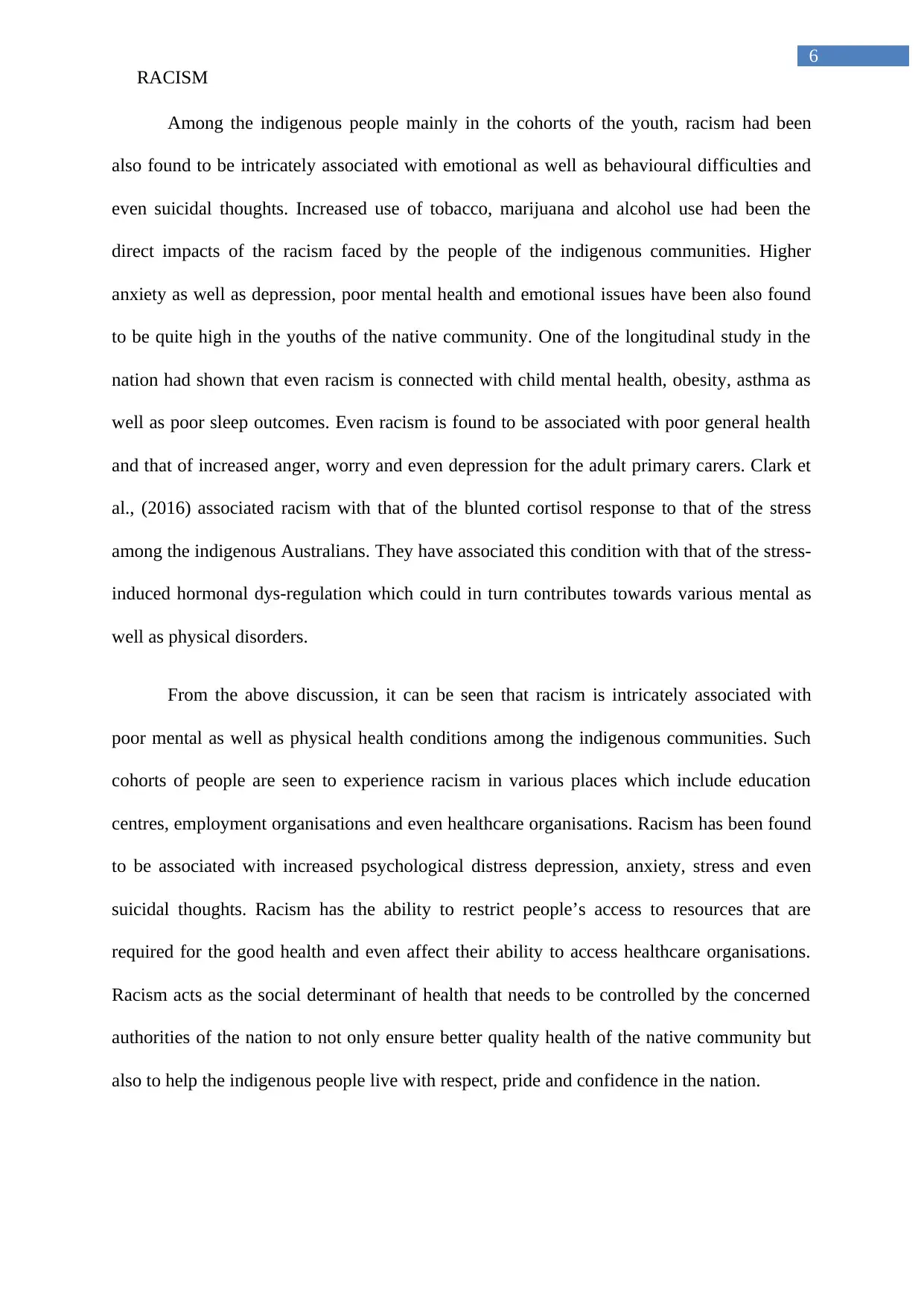
6
RACISM
Among the indigenous people mainly in the cohorts of the youth, racism had been
also found to be intricately associated with emotional as well as behavioural difficulties and
even suicidal thoughts. Increased use of tobacco, marijuana and alcohol use had been the
direct impacts of the racism faced by the people of the indigenous communities. Higher
anxiety as well as depression, poor mental health and emotional issues have been also found
to be quite high in the youths of the native community. One of the longitudinal study in the
nation had shown that even racism is connected with child mental health, obesity, asthma as
well as poor sleep outcomes. Even racism is found to be associated with poor general health
and that of increased anger, worry and even depression for the adult primary carers. Clark et
al., (2016) associated racism with that of the blunted cortisol response to that of the stress
among the indigenous Australians. They have associated this condition with that of the stress-
induced hormonal dys-regulation which could in turn contributes towards various mental as
well as physical disorders.
From the above discussion, it can be seen that racism is intricately associated with
poor mental as well as physical health conditions among the indigenous communities. Such
cohorts of people are seen to experience racism in various places which include education
centres, employment organisations and even healthcare organisations. Racism has been found
to be associated with increased psychological distress depression, anxiety, stress and even
suicidal thoughts. Racism has the ability to restrict people’s access to resources that are
required for the good health and even affect their ability to access healthcare organisations.
Racism acts as the social determinant of health that needs to be controlled by the concerned
authorities of the nation to not only ensure better quality health of the native community but
also to help the indigenous people live with respect, pride and confidence in the nation.
RACISM
Among the indigenous people mainly in the cohorts of the youth, racism had been
also found to be intricately associated with emotional as well as behavioural difficulties and
even suicidal thoughts. Increased use of tobacco, marijuana and alcohol use had been the
direct impacts of the racism faced by the people of the indigenous communities. Higher
anxiety as well as depression, poor mental health and emotional issues have been also found
to be quite high in the youths of the native community. One of the longitudinal study in the
nation had shown that even racism is connected with child mental health, obesity, asthma as
well as poor sleep outcomes. Even racism is found to be associated with poor general health
and that of increased anger, worry and even depression for the adult primary carers. Clark et
al., (2016) associated racism with that of the blunted cortisol response to that of the stress
among the indigenous Australians. They have associated this condition with that of the stress-
induced hormonal dys-regulation which could in turn contributes towards various mental as
well as physical disorders.
From the above discussion, it can be seen that racism is intricately associated with
poor mental as well as physical health conditions among the indigenous communities. Such
cohorts of people are seen to experience racism in various places which include education
centres, employment organisations and even healthcare organisations. Racism has been found
to be associated with increased psychological distress depression, anxiety, stress and even
suicidal thoughts. Racism has the ability to restrict people’s access to resources that are
required for the good health and even affect their ability to access healthcare organisations.
Racism acts as the social determinant of health that needs to be controlled by the concerned
authorities of the nation to not only ensure better quality health of the native community but
also to help the indigenous people live with respect, pride and confidence in the nation.
Paraphrase This Document
Need a fresh take? Get an instant paraphrase of this document with our AI Paraphraser
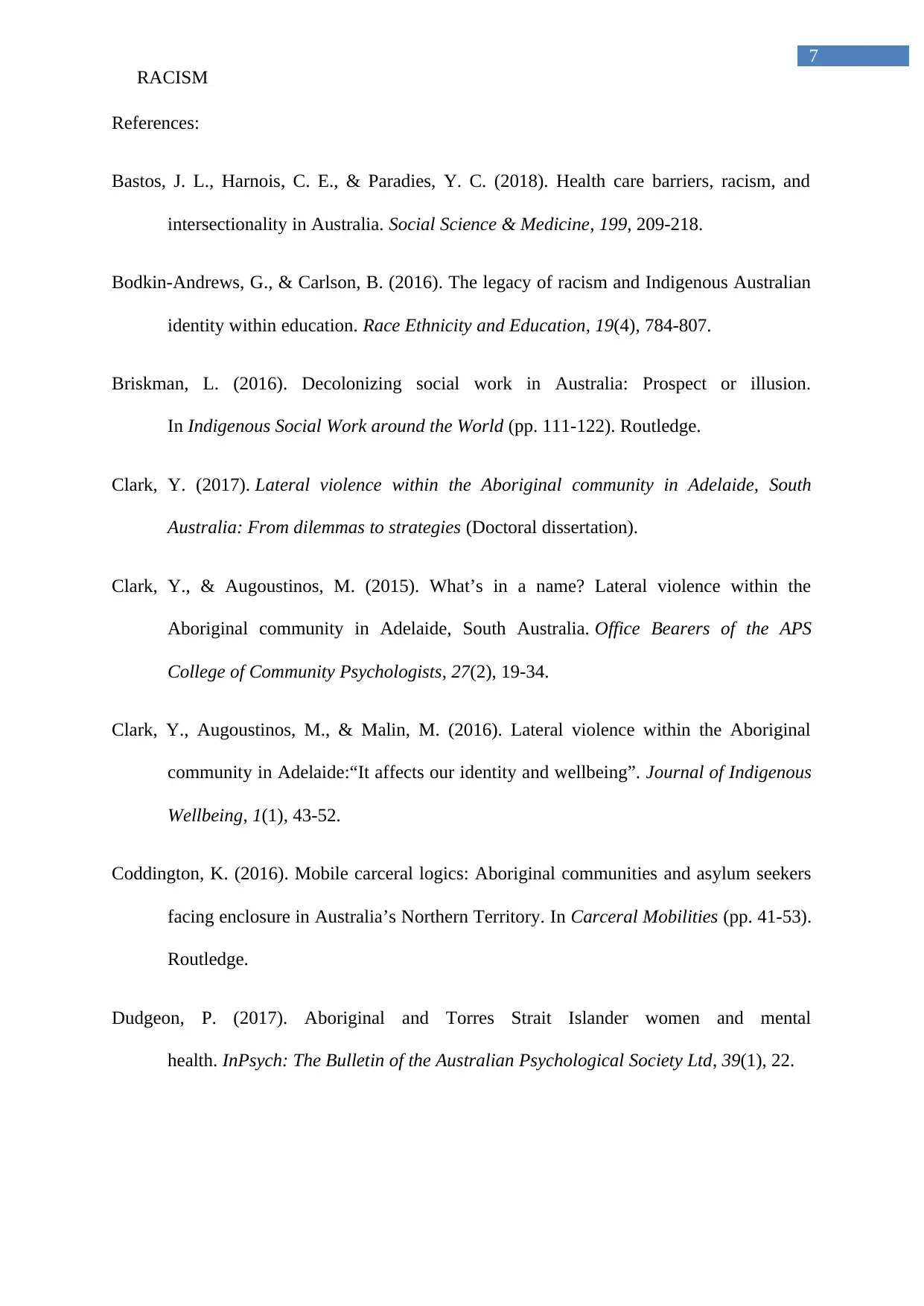
7
RACISM
References:
Bastos, J. L., Harnois, C. E., & Paradies, Y. C. (2018). Health care barriers, racism, and
intersectionality in Australia. Social Science & Medicine, 199, 209-218.
Bodkin-Andrews, G., & Carlson, B. (2016). The legacy of racism and Indigenous Australian
identity within education. Race Ethnicity and Education, 19(4), 784-807.
Briskman, L. (2016). Decolonizing social work in Australia: Prospect or illusion.
In Indigenous Social Work around the World (pp. 111-122). Routledge.
Clark, Y. (2017). Lateral violence within the Aboriginal community in Adelaide, South
Australia: From dilemmas to strategies (Doctoral dissertation).
Clark, Y., & Augoustinos, M. (2015). What’s in a name? Lateral violence within the
Aboriginal community in Adelaide, South Australia. Office Bearers of the APS
College of Community Psychologists, 27(2), 19-34.
Clark, Y., Augoustinos, M., & Malin, M. (2016). Lateral violence within the Aboriginal
community in Adelaide:“It affects our identity and wellbeing”. Journal of Indigenous
Wellbeing, 1(1), 43-52.
Coddington, K. (2016). Mobile carceral logics: Aboriginal communities and asylum seekers
facing enclosure in Australia’s Northern Territory. In Carceral Mobilities (pp. 41-53).
Routledge.
Dudgeon, P. (2017). Aboriginal and Torres Strait Islander women and mental
health. InPsych: The Bulletin of the Australian Psychological Society Ltd, 39(1), 22.
RACISM
References:
Bastos, J. L., Harnois, C. E., & Paradies, Y. C. (2018). Health care barriers, racism, and
intersectionality in Australia. Social Science & Medicine, 199, 209-218.
Bodkin-Andrews, G., & Carlson, B. (2016). The legacy of racism and Indigenous Australian
identity within education. Race Ethnicity and Education, 19(4), 784-807.
Briskman, L. (2016). Decolonizing social work in Australia: Prospect or illusion.
In Indigenous Social Work around the World (pp. 111-122). Routledge.
Clark, Y. (2017). Lateral violence within the Aboriginal community in Adelaide, South
Australia: From dilemmas to strategies (Doctoral dissertation).
Clark, Y., & Augoustinos, M. (2015). What’s in a name? Lateral violence within the
Aboriginal community in Adelaide, South Australia. Office Bearers of the APS
College of Community Psychologists, 27(2), 19-34.
Clark, Y., Augoustinos, M., & Malin, M. (2016). Lateral violence within the Aboriginal
community in Adelaide:“It affects our identity and wellbeing”. Journal of Indigenous
Wellbeing, 1(1), 43-52.
Coddington, K. (2016). Mobile carceral logics: Aboriginal communities and asylum seekers
facing enclosure in Australia’s Northern Territory. In Carceral Mobilities (pp. 41-53).
Routledge.
Dudgeon, P. (2017). Aboriginal and Torres Strait Islander women and mental
health. InPsych: The Bulletin of the Australian Psychological Society Ltd, 39(1), 22.
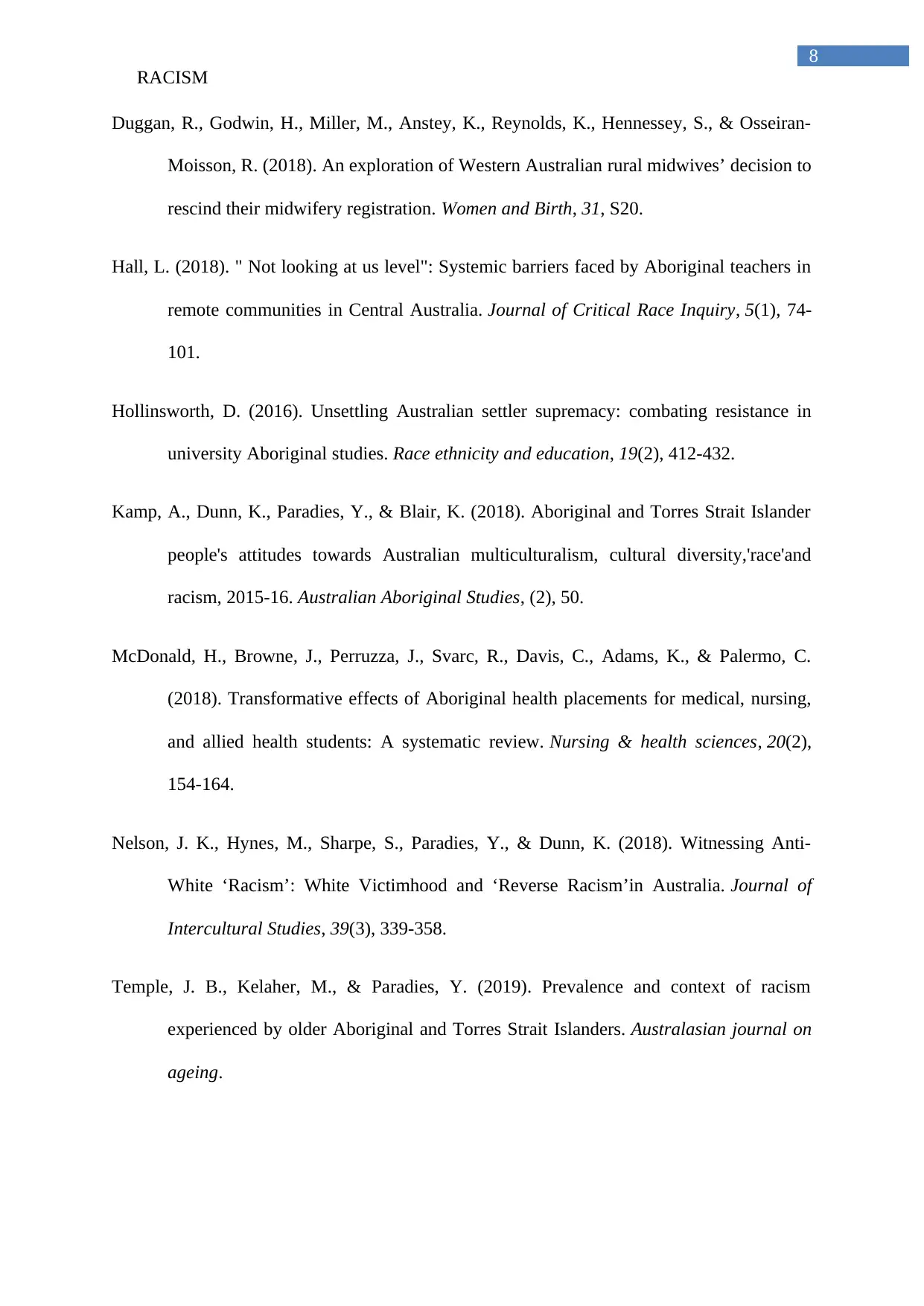
8
RACISM
Duggan, R., Godwin, H., Miller, M., Anstey, K., Reynolds, K., Hennessey, S., & Osseiran-
Moisson, R. (2018). An exploration of Western Australian rural midwives’ decision to
rescind their midwifery registration. Women and Birth, 31, S20.
Hall, L. (2018). " Not looking at us level": Systemic barriers faced by Aboriginal teachers in
remote communities in Central Australia. Journal of Critical Race Inquiry, 5(1), 74-
101.
Hollinsworth, D. (2016). Unsettling Australian settler supremacy: combating resistance in
university Aboriginal studies. Race ethnicity and education, 19(2), 412-432.
Kamp, A., Dunn, K., Paradies, Y., & Blair, K. (2018). Aboriginal and Torres Strait Islander
people's attitudes towards Australian multiculturalism, cultural diversity,'race'and
racism, 2015-16. Australian Aboriginal Studies, (2), 50.
McDonald, H., Browne, J., Perruzza, J., Svarc, R., Davis, C., Adams, K., & Palermo, C.
(2018). Transformative effects of Aboriginal health placements for medical, nursing,
and allied health students: A systematic review. Nursing & health sciences, 20(2),
154-164.
Nelson, J. K., Hynes, M., Sharpe, S., Paradies, Y., & Dunn, K. (2018). Witnessing Anti-
White ‘Racism’: White Victimhood and ‘Reverse Racism’in Australia. Journal of
Intercultural Studies, 39(3), 339-358.
Temple, J. B., Kelaher, M., & Paradies, Y. (2019). Prevalence and context of racism
experienced by older Aboriginal and Torres Strait Islanders. Australasian journal on
ageing.
RACISM
Duggan, R., Godwin, H., Miller, M., Anstey, K., Reynolds, K., Hennessey, S., & Osseiran-
Moisson, R. (2018). An exploration of Western Australian rural midwives’ decision to
rescind their midwifery registration. Women and Birth, 31, S20.
Hall, L. (2018). " Not looking at us level": Systemic barriers faced by Aboriginal teachers in
remote communities in Central Australia. Journal of Critical Race Inquiry, 5(1), 74-
101.
Hollinsworth, D. (2016). Unsettling Australian settler supremacy: combating resistance in
university Aboriginal studies. Race ethnicity and education, 19(2), 412-432.
Kamp, A., Dunn, K., Paradies, Y., & Blair, K. (2018). Aboriginal and Torres Strait Islander
people's attitudes towards Australian multiculturalism, cultural diversity,'race'and
racism, 2015-16. Australian Aboriginal Studies, (2), 50.
McDonald, H., Browne, J., Perruzza, J., Svarc, R., Davis, C., Adams, K., & Palermo, C.
(2018). Transformative effects of Aboriginal health placements for medical, nursing,
and allied health students: A systematic review. Nursing & health sciences, 20(2),
154-164.
Nelson, J. K., Hynes, M., Sharpe, S., Paradies, Y., & Dunn, K. (2018). Witnessing Anti-
White ‘Racism’: White Victimhood and ‘Reverse Racism’in Australia. Journal of
Intercultural Studies, 39(3), 339-358.
Temple, J. B., Kelaher, M., & Paradies, Y. (2019). Prevalence and context of racism
experienced by older Aboriginal and Torres Strait Islanders. Australasian journal on
ageing.
⊘ This is a preview!⊘
Do you want full access?
Subscribe today to unlock all pages.

Trusted by 1+ million students worldwide
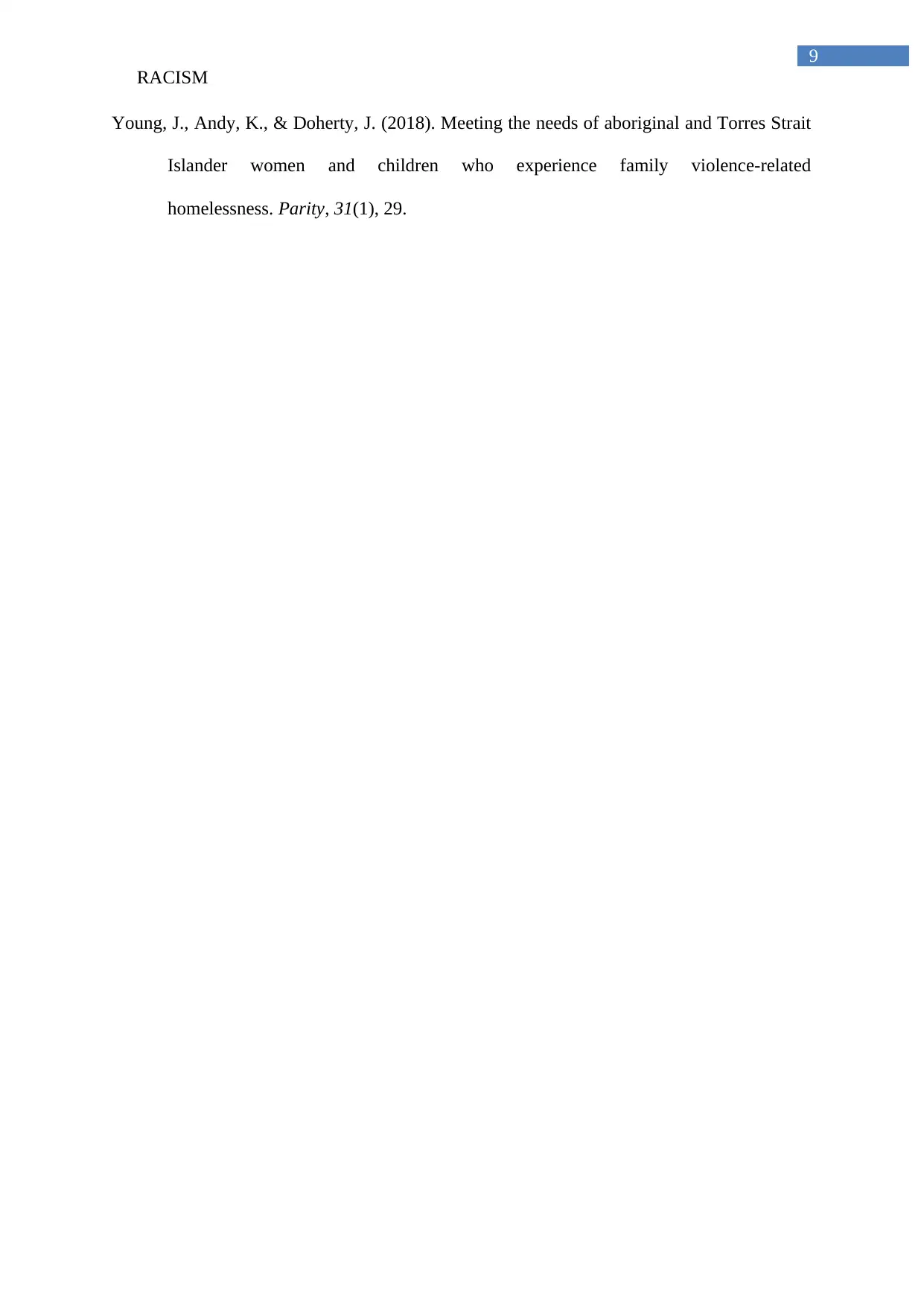
9
RACISM
Young, J., Andy, K., & Doherty, J. (2018). Meeting the needs of aboriginal and Torres Strait
Islander women and children who experience family violence-related
homelessness. Parity, 31(1), 29.
RACISM
Young, J., Andy, K., & Doherty, J. (2018). Meeting the needs of aboriginal and Torres Strait
Islander women and children who experience family violence-related
homelessness. Parity, 31(1), 29.
1 out of 10
Related Documents
Your All-in-One AI-Powered Toolkit for Academic Success.
+13062052269
info@desklib.com
Available 24*7 on WhatsApp / Email
![[object Object]](/_next/static/media/star-bottom.7253800d.svg)
Unlock your academic potential
Copyright © 2020–2026 A2Z Services. All Rights Reserved. Developed and managed by ZUCOL.





